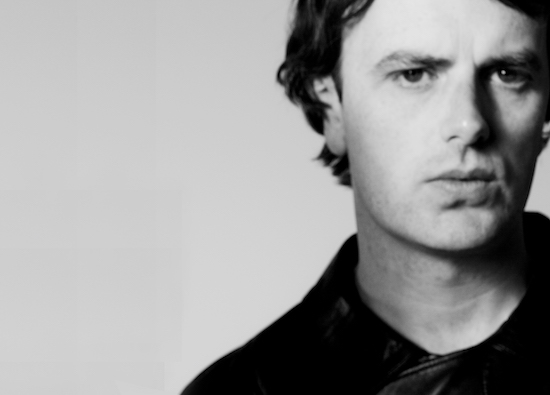Back in 2004, Passarella Death Squad was doing something quite unfamiliar in Britain, producing records, fine art and high fashion all under the same moniker. The Passarella name might not ring familiar, but chances are you’re aware of the squad’s output: PDS t-shirts are sold in Urban Outfitters and Selfridges, and founder Danny Broddle – aka Danny Passarella – has released heavy, discomforting electronic music with the likes of Oliver Ho and, notably, collaborated with Perc on an EP inspired by David Cronenberg’s horror film, Videodrome.
Over a pint of Guinness – “I was gonna have a coke, but now we’re here…” – Broddle talks largely with a candid, exuberant ease ahead of his latest release, Hyperreal. Incidentally ‘Passarella Death Squad’ doesn’t mean anything – “I just thought it sounded good,” he says, without missing a beat.
His Newcastle accent still weighs strong in spite of a couple decades in the big smoke. We’re in a pub in Angel, near to where Broddle once lived – though he finds the area unrecognisable now: “I used to know loads of nice, cheap enough places here, but they’ve all shut down.” Still, he recommends Electrowerkz round the corner for nights that play good underground music.
Broddle credits the founding of the Death Squad in part to a childhood fascination of his, back in 1980s Newcastle: “I was really into breakdancing. The scene in Newcastle was huge, and it was so exciting. And it was basically a three-pronged package: you had the music, the clothing element and the artwork. We were all so into it, and I suppose it made me want to do something too.”
Twenty years later when he founded PDS, he had that package very much in mind – though, admittedly, that’s where any salient comparison between his creative output and the breakdancing scene ends.
It was a strange space to occupy at the time: “We didn’t want people to think we were a record label forcing clothing and art they didn’t want down their throats, because obviously music is a very precious, personal thing. We didn’t want to get it wrong.”
Things quickly began to flourish, with the clothing range in particular taking off – newspaper columns were starting to feature the T-shirts, with the sexualised prints appealing to those in the fetish scenes as well as the high fashion ones. The interest meant Broddle was able to quit his job as a freelance designer and dedicate his time fully to the PDS output – “Suddenly it wasn’t just a hobby.”
While he is at ease talking about the clothes, however, he doesn’t seem entirely sure how to answer queries regarding his music production.
What artists inspire him?
“Oh, um…”
We’re here to talk about his upcoming record, what does it sound like?
“The music that I make… it’s just the music that I like. I know that’s a shit answer, just I don’t really know how to describe it,” he says with a laugh, “A better artist would probably give you a better answer.”
For the record, Hyperreal – produced by Broddle himself along with Thomas Wegg-Prosser – is oddly theatrical electronic music that’s as immersive as it is unusual. Attempting to capture aspects of 1970s VHS sci-fi, the layers of the (“unfashionable”) Roland MC-303 groovebox bubble with an ominous grandeur – it’s ultimately more abstract electronica than tech house. The whole thing sounds like an uneasy but quite beautiful soundtrack to night-time explorations in an alien world – or, indeed, like a fitting accompaniment to watching VHS white noise.
The sounds, when considered alongside his off-kilter designs and mesmerising artwork, do make the record seem quintessentially him. He’s pleased with the assessment: “That’s all you can hope for really, isn’t it? If you’re making art because you enjoy it and people can tell it’s you – a signature sound. That’s all I want.”
Indeed, none of his success has ever been part of a planned business strategy. He talks at one point about organising coach trips across the country to get people to raves back in the 90s – he did it for fun, not because of the money he ended up making. Britain’s climate is different for young people in the creative world now though, he acknowledges – and not just because “they’re more likely to buy drugs from the internet than from a dealer”.
“Creatively speaking, it’s going to be very interesting… no, that’s the wrong word… it’s going to painful watching how people will be increasingly denied education, denied opportunities. University is becoming for the privileged few, and the underground element of the art world is being slowly eroded over time. It’s hard to do wonderful creative things when you’re not getting paid, so only a certain type of person can do well now. If I was starting now I don’t think I’d get anywhere.”
Broddle’s latest record feels somehow comforting in response to all this speculation and uncertainty, however. For all the spacy uneasiness that seems to permeate Hyperreal, there is a warmth to it too. Broddle might not be able to put his finger on what he’s producing, and he may not be able to predict how things will go for the next generation of creatives – but this record seems proof that maybe there’s a kind of strange beauty in not knowing.
Hyperreal is out May 12 on Passarella Records


